The 9 Weirdest Animal Penises
Wild variety
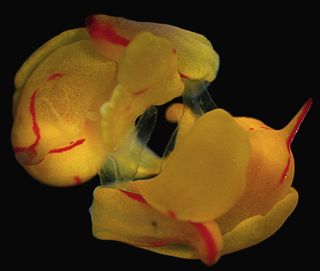
In the animal kingdom, penises can be weird and wild things. Males of just about every animal species use some form of the organ to shoot sperm into females' eggs and create more little critters. But that's where the similarities end. Evolution has selected for some remarkable innovations in penis design. From detachable sex organs to spiked heads, Life's Little Mysteries explores the strange world of wildlife wieners.
Argentine blue-bill lake duck
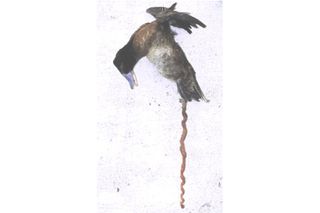
The Argentine lake duck has something to quack about. Its penis is a whopping 17 inches long, proportionally the longest of all vertebrates. It's especially impressive among birds: Most male birds don't have penises, and instead mate by briefly touching genital openings with females. The Argentine lake duck has a corkscrew-shaped appendage, which mirrors the female’s oppositely corkscrewed vagina. No one knows why this duck evolved a gigantic member, but some researchers have speculated that the giant penis may be an example of "runaway" sexual selection, where female preference drives male anatomy to extremes, as in the peacock's tail.
Flatworm
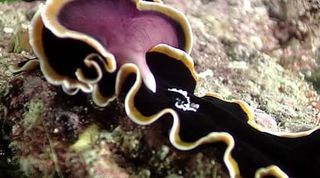
This photo might look like a silky, velvet ribbon, but it's actually two flatworms in the middle of an epic penis battle. Yes — a penis battle. Marine flatworms are hermaphroditic—meaning each flatworm has both male and female reproductive organs. It takes more energy to produce eggs than sperm, so each flatworm wants to be the male in the relationship and tries to impregnate the others without getting pregnant itself. This results in a sort of "penis-fencing" when the two flatworms meet. This duel may last an hour and result in gaping wounds on the body of the loser (in addition to a flatworm bun in the oven).
Barnacle
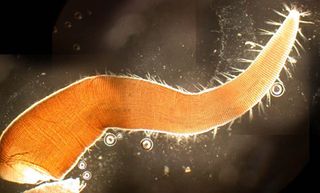
Barnacles spend their lives glued to rocks, which makes mingling with other barnacles rather difficult. That’s one reason why they sport penises that are up to 40 times their size – the biggest penises in the animal kingdom (take that, Argentine lake duck!). The hermaphroditic animals regrow their penises each year, just before their brief mating season. One study found that water conditions change the shape and size of barnacle members — in calm water, they grow long and flexible penises, while choppy conditions inspire stockier, muscle-bound members.
Bean weevil
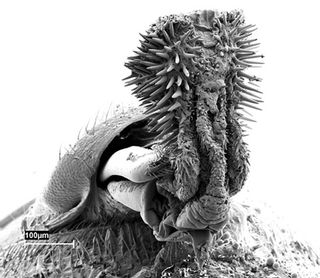
The bean weevil, a type of beetle, has developed a less-than-pleasant device for delivering sperm into the female’s vagina: Its penis is covered with hard, sharp spikes. Researchers have found that each act of mating scars the female beetle's reproductive tract, resulting in traumatic insemination. It's possible that the injuries directly benefit the males, however, either because they prevent the females from mating again or force them to spend more effort raising their fertilized eggs — and thus insuring that the male's genes are passed on — and avoid the strain of future liaisons.
Python
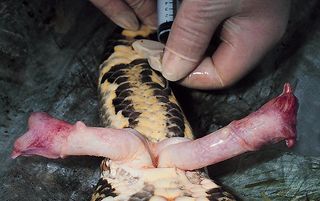
Two heads are better than one, right? Snakes have a Y-shaped hemipenis, and during sex they only use one-half of the organ, often alternating which half from sex act to sex act. The hemipenises are often grooved, hooked, or spined in order to grip the walls of the female's opening (known as a cloaca) and keep her from squirming away.
Echidna
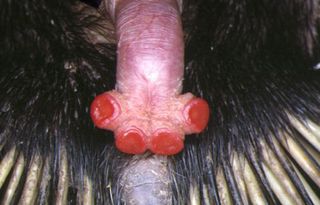
If two heads are great, imagine a four-headed penis. The echidna, a small egg-laying mammal, has four heads on its organ. All four heads won't fit into a female, so during mating, the heads on one side shut down and do not enlarge; the other two release semen into the female's two-branched reproductive tract. The active heads alternate usage each time the mammal copulates. This evolutionary quirk puzzled scientists for years until they observed the animal’s behavior – with up to a dozen males following one female, four heads are necessary to deploy more sperm than the competition.
Argonaut
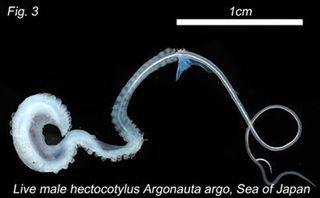
Our No. 1 weirdest animal penis goes to the argonaut octopus , a type of nautilus. This tentacle animal swims around in the ocean, but while it’s busy looking for food and checking out the sights, the argonaut’s penis simply detaches itself and swims away to look for ladyparts. When scientists first encountered the disembodied penis, they thought it was a parasitic worm. It was only years later that they discovered the swimming organ was actually a zombielike sperm bomb.
Sign up for the Live Science daily newsletter now
Get the world’s most fascinating discoveries delivered straight to your inbox.
